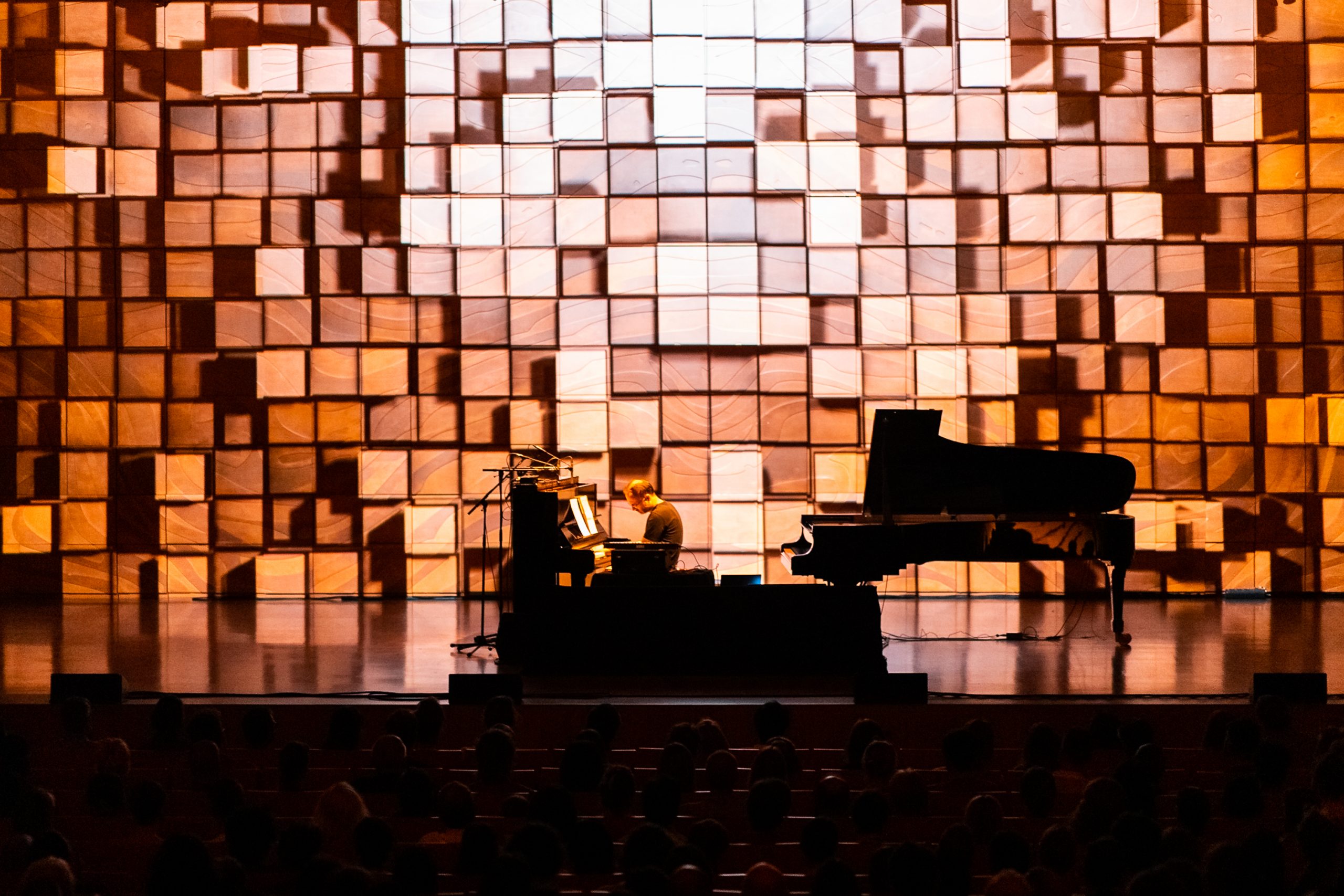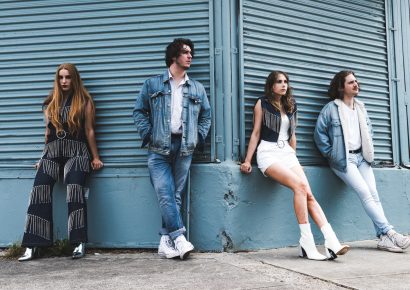This July will see Melbourne Recital Centre transform into something of a mesmeric temple as it welcomes a number of artists onto its Sanctuary lineup.
Featuring the likes of James Howard, Zoe Knighton, Nick Tsiavos, and more, Sanctuary invites audience members to sit back and bask in the warmth and nurturing ambience of live performance as it provides two days of reflective, thoughtful, and meditative music.
Beginning on Friday July 8, Sanctuary kicks off with its Audience Of One event, which sees audience members urged to take a leap of faith as a “mystery Melbourne virtuoso” provides a spellbinding experience that we can confirm will be nothing short of brilliant.
Read Melbourne’s most comprehensive range of features and interviews here.
The following day sees Jaadwa songwriter and composer James Howard exploring his family history and the stories that have shaped his life as part of his Ancestral Redux performance, with electronic instruments, vocals, and field recordings blurring the lines between Country, culture, politics, and identity.
That evening, Sanctuary comes to a close with the eclectic Sanctuary Suite, a powerful exploration of reflective, thoughtful, and meditative music which features Lady Lash, Zoe Knighton, Nick Tsiavos, and Nat Bartsch and Luke Howard performing at the Elisabeth Murdoch Hall.
One of the Sanctuary Suite’s most powerful performances however, will be the collaboration between Chinese/Australian composer and guzheng player Mindy Meng Wang and Australian pianist and composer Paul Grabowsky AO.
Speaking to Beat ahead of the performance, Grabowsky explains that a series such as Sanctuary is set to not only allow audience members to reconnect with live performances, but to also underline how important music has become over these past few years.
“We’re reminded of why music is important and what its healing capacities can be,” Grabowsky notes.
Forcibly sidelined throughout much of 2020 and 2021 like the rest of us, Grabowsky was able to maintain a little bit of creative momentum. His 2020 collaboration with Paul Kelly, Please Leave Your Light On, went on to win Best Jazz Album at that year’s ARIA Awards, while he also managed to sneak through a few performances with the Melbourne Symphony Orchestra as part of his role as 2021’s Composer In Residence.
Despite a career spent in small and intimate venues as a famed jazz musician, an event such as Sanctuary allows its audience to reconnect with sound on a grand scale, as the Recital Centre’s spacious stages are occupied by artists who exist to push sonic boundaries.
“What I love about what they’re doing at Recital Centre is that they’re taking rooms, which were essentially built for the performance of classical music originally, but really thinking laterally about the programming,” he explains.
“If you look at the artists they’re assembling for that particular program, it’s a very broad and interesting array of people.
“It’s the sort of gig I would go to if I wasn’t actually playing it.”
The beauty of Sanctuary and its Sanctuary Suite event lies within its programming, with its lineup comprising artists who compose and create music which provokes thought, reflection, and offers a meditative experience. Thus, an artist like Paul Grabowsky being on the bill makes sense. While contemporary musicians may be more inclined to veer away from open aural space and silence, Grabowsky’s back catalogue is as varied as it is accomplished, with his compositions frequently ranging in sonic flavour from the sparse to the dense.
“A lot of pop or rock music is pretty dense sonically, and certainly techno can be very dense sonically, but there’s a lot of interest now in ambient music, whether it’s acoustic or electo-acoustic,” he notes.
“I think that that kind of music has really come into its own and a lot of people really seek it out, along with experiencing music which is going to put them into a very pleasant or reflective state.”
Somewhat ironically though, it’s this type of music which appears to have had something of a resurgence throughout the past few years. While the world felt as though it was crumbling down around us due to a global pandemic, many music-lovers found themselves seeking a form of escape through instrumental or ambient music. Its purpose seemed to be to provide a sense of comfort or – dare we say it – sanctuary.
“I think it will take a long time for us to be able to really understand what the net effect of the last couple of years has been on the great majority of people,” Grabowsky explains. “I don’t think it’s possible to be able to assess all the data which might be available to, to form a view about it.
“But I know that for a lot of people, that was a very challenging time. Music is one of those things which can really help people to find a sort of a safe space, a place where they can feel that they can get away from what is after all, not just COVID, but with the other things that are going on in the world. It’s a pretty stressful time right now.”
One of the notable musical arrivals throughout these past few years was last year’s Phoenix Rising, the eclectic studio album from acclaimed composer and guzheng player Mindy Meng Wang.
The opening track on this record, ‘Night Storm’, was a collaboration between Mindy and Grabowsky, with the pair combining to create a musical composition that can only be described as otherworldly. As Grabowsky notes, the pair had known each other for some time, but only had the chance to formally work together last year, with their musical focuses first aligning due to their shared desire of providing truly mesmerising music.
“[Mindy] has been deeply trained in an age-old Chinese traditional/classical discipline, and brings all the poetics and aesthetics of that tradition into her work, and therefore into a dialogue with whatever it is that I bring to it,” Grabowsky explains.
“It’s fascinating for me to be able to reach out and interact with that particular form of expression. It’s so subtle and refined, but she’s also really interested in expanding the expressive range of what her instrument – the guzheng – is capable of, so she’s totally excited about bringing the instrument into dialogue with all sorts of different contemporary music.”
Though on paper, the combination between Mindy’s guzheng and Grabowsky’s piano appears difficult to fully mesh together, Grabowsky notes that their own musical approaches combined in such a way that they almost instantaneously crafted a musical dialogue that still resonates.
“I’ve got the entire palate of chromatic music at my disposal, whereas when Mindy is tuned to a particular [musical] mode, that particular mode becomes the driving force of the musical information,” he explains. “So it becomes about working out a way of being able to bring all of those things into some sort of interesting relationship.
“The wonderful thing was that when we started to play together, it was very easy. It wasn’t as if we had to really fish around and find a way of playing. I think that we both inherently understood pretty much from the get-go that there was a communication there and that we were both willing to really explore that communication.
“And I think we’re still very much at the beginning of that particular journey,” Grabowsky adds. “I’m really looking forward to doing more because, as I say, the tradition that she’s coming from and that she understands, it’s so rich and probably one of the oldest classical traditions in the world. And to have that coming at you as musical information and to be able to respond to it is a real thrill.”
Ultimately, the pair aim to continue their collaborative efforts in the future, with a duet recording likely in the pipeline, with Mendy herself hoping to take their work to China. But before any of that happens, the duo will appear onstage together as part of Sanctuary on Saturday, 9 July.
So, what will their collaborative performance actually sound like? Will ‘Night Storm’ serve as an indicator of what to expect, or will their musical dialogue result in an improvised conversation that defies all expectation? As Grabowsky explains, the latter is most likely.
“It really depends on how we read the room at the time we’re playing,” he explains. “‘Night Storm’, the day we recorded that, we recorded about – I can’t remember how many – but maybe seven or eight tracks, and that was the one that we chose for the CD.
“Looking at or listening to other recordings that we’ve done or videos of us playing at different times, I now realise that there’s quite a range of things that we’re able to create.
“‘Night Storm’ is an interesting one because it’s quite a dark kind of piece, but some of the music is incredibly sort of placid and calm,” he concludes. “So exactly what’s going to roll out on the day, I don’t know, but it’ll be interesting; it’ll be fun. I know that much.”
Check out the entire Sanctuary program and find out more info here.
This article was made in partnership with Melbourne Recital Centre.

